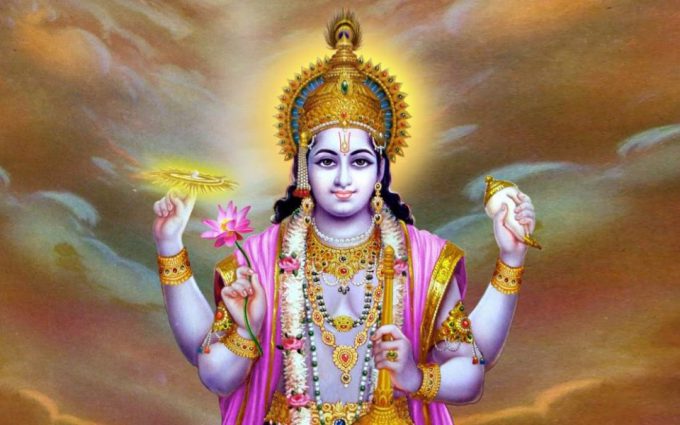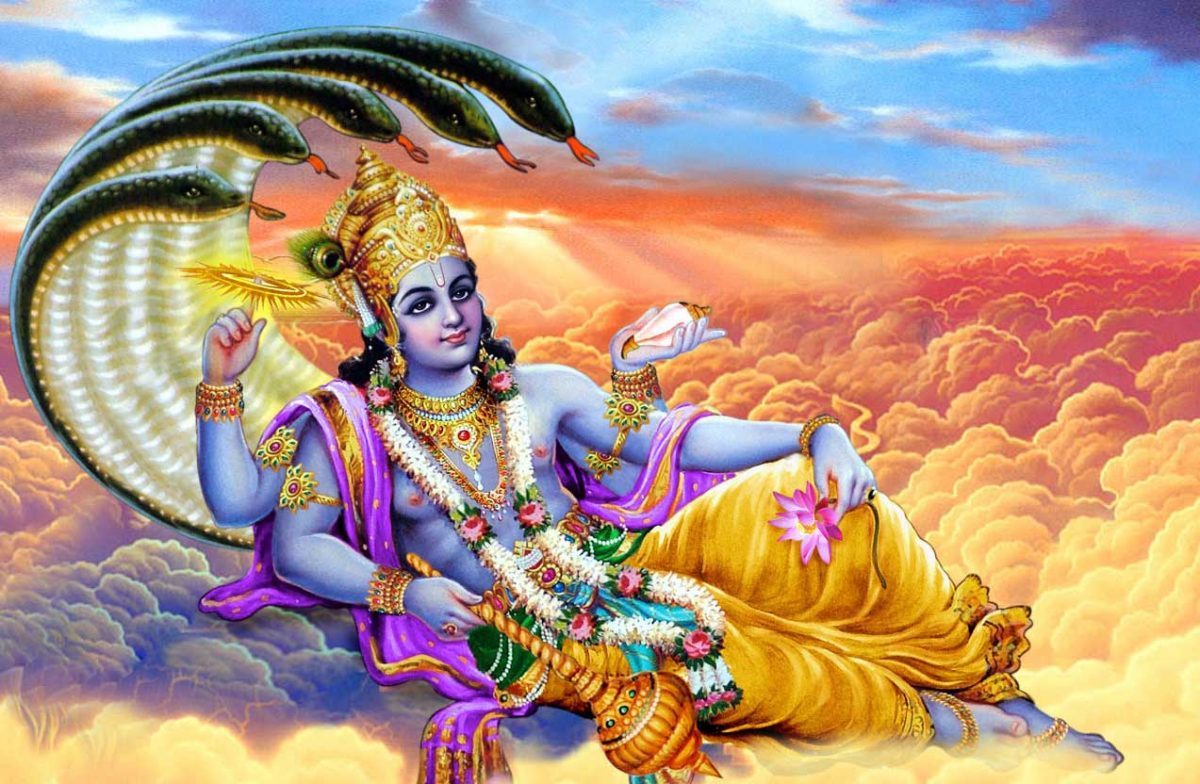The most commonly used Vedic Sanskrit hymn, Purusha Suktam is chanted in all the Vedic rituals and ceremonies. It is used during the worship of the Deity of Narayana or Vishnu in the temple, fire ceremonies. It is also a part of the daily recitation of hymns in one’s meditation.
The Purusha Suktam gives the essence of the philosophy of Vedanta and the Vedic tradition. It incorporates the principles of knowledge, meditation, rituals, devotion, and duties. This is why it is regarded and used extensively even in the modern world as much as it was thousands of years ago.

Purusha Suktam Rig Veda
The Purusha Suktam was first found in the Rig Veda as the 60th Suktam of the 10th mandala with 16 mantras. Purusha Suktam is generally recommended for daily chanting. It describes the form of the Purushottam or Narayana and his attributes. Here are the lyrics of the Suktam:
सहस्रशीर्षा पुरुषः सहस्राक्षः सहस्रपात्
स भूमिं विश्वतो वृत्वात्यतिष्ठद्दशाङुलम् ॥१॥
पुरुष एवेदं सर्वं यद्भूतं यच्च भव्यम् ।
उतामृतत्वस्येशानो यदन्नेनातिरोहति ॥२॥
एतावानस्य महिमातो ज्यायाँश्च पूरुषः ।
पादोऽस्य विश्वा भूतानि त्रिपादस्यामृतं दिवि ॥३॥
त्रिपादूर्ध्व उदैत्पूरुषः पादोऽस्येहाभवत्पुनः ।
ततो विष्वङ् व्यक्रामत्साशनानशने अभि ॥४॥
तस्माद्विराळजायत विराजो अधि पूरुषः ।
स जातो अत्यरिच्यत पश्चाद्भूमिमथो पुरः ॥५॥
यत्पुरुषेण हविषा देवा यज्ञमतन्वत ।
वसन्तो अस्यासीदाज्यं ग्रीष्म इध्मः शरद्धविः ॥६॥
तं यज्ञं बर्हिषि प्रौक्षन्पुरुषं जातमग्रतः ।
तेन देवा अयजन्त साध्या ऋषयश्च ये ॥७॥
तस्माद्यज्ञात्सर्वहुतः सम्भृतं पृषदाज्यम् ।
पशून्ताँश्चक्रे वायव्यानारण्यान् ग्राम्याश्च ये ॥८॥
तस्माद्यज्ञात्सर्वहुत ऋचः सामानि जज्ञिरे ।
छन्दांसि जज्ञिरे तस्माद्यजुस्तस्मादजायत ॥९॥
तस्मादश्वा अजायन्त ये के चोभयादतः ।
गावोः ह जज्ञिरे तस्मात् तस्माज्जाता अजावयः ॥१०॥
यत्पुरुषं व्यदधुः कतिधा व्यकल्पयन् ।
मुखं किमस्य कौ बाहू का ऊरू पादा उच्येते ॥११॥
ब्राह्मणोऽस्य मुखमासीद् बाहू राजन्यः कृतः ।
ऊरू तदस्य यद्वैश्यः पद्भ्यां शूद्रो अजायत ॥१२॥
चन्द्रमा मनसो जातश्चक्षोः सूर्यो अजायत ।
मुखादिन्द्रश्चाग्निश्च प्राणाद्वायुरजायत ॥१३॥
नाभ्या आसीदन्तरिक्षं शीर्ष्णो द्यौः समवर्तत ।
पद्भ्यां भूमिर्दिशः श्रोत्रात्तथा लोकाँ अकल्पयन् ॥१४॥
सप्तास्यासन् परिधयस्त्रिः सप्त समिधः कृताः ।
देवा यद्यज्ञं तन्वाना अबध्नन्पुरुषं पशुम् ॥१५॥
यज्ञेन यज्ञमयजन्त देवास्तानि धर्माणि प्रथमान्यासन् ।
ते ह नाकं महिमानः सचन्त यत्र पूर्वे साध्याः सन्ति देवाः ॥१६॥
वेदाहमेतं पुरुषं महान्तं आदित्यवर्णं तमसः परस्तात
तमेवं विद्वान अमृत इह भवतिनान्यः पन्था विद्यते’यानाय ||१७||ॐ शान्ति शान्ति शन्तिहि ||
Purusha Suktam Meaning
Om sahasra shirsha purushaha
sahasrakshas sahasrapat
sa bhumim vishvato vritva
atyatishthad dhashangulam
Meaning:
The Purusha has a thousand heads, a thousand eyes, and a thousand feet. Enveloping the world from all sides, he transcends it by a length of ten fingers.
Purusha evedagam sarvam
yadbhutam yaccha bhavyam
utamritatva syeshanaha
yadanne natirohati
etavanasya mahima
ato jyayagamshcha purushaha
padosya vishva bhutani
tripadasya mritam divi
Meaning:
All this is the Purusha alone. Whatever he was and whatever he will become. He is the Lord of immortality. He transcends in his form that grows by food. One-fourth of Him are all beings here while three-fourths of Him rises above as the Immortal Being.
Tripadurdhva udaitpurushaha
padosyeha bhavatpunaha
tato vishvajya kramat
sashana ashane abhi
tasmad viradajayata
virajo adhi purushah
sa jato atyarichyata
pashchad bhumimatho puraha
Meaning:
Three-quarters of the energy of the Purusha ascended above and one-quarter of his energy becomes the creation. He pervades universally, the conscious as well as the unconscious. Having manifested himself, he appears as all diversity and then as this earth and this body.
Yatpurushena havisha
deva yajnam atanvata
vasanto asyasidajyam
grishma idhmash sharaddhavihi
tam yajnam barhishipraukshan
purusham jatamagrataha
tena deva ayajantaha
sadhya rishayashchaye
Meaning:
When the devas performed a yagna using the Purusha as the sacred offering, the spring turned into ghee, summer served as the fuel and autumn became the oblation.
Tasmad yajnat sarvahutaha
sambhritam vrishadajyam
pashugamstya gashchakre
vayavyan aranyan gramashcayeTasmad yajnat sarvahutaha
richassamani jijignire
chandhagamsi jijignire tasmat
yajus tasmad ajayata
Meaning:
From that Purusha, the form of universal sacrifice, the sacred mixture of ghee and curds were produced. Birds flying in the air, wild animals in the forest and domestic animals in the villages were also produced.
Tasmadashva ajayata
ye ke cobhaya dataha
gavo ha jijignire tasmat
tasmad jnata ajavayaha
Meaning:
From Him were also born horses and other animals with two rows of teeth. The cattle was also born from him. From Him were born the sheep and goats.
Yatpurusham vyadadhuhu
kadhita vyakalpayan
mukham kimasya kau bahu
kavuru padavuchayate
Meaning:
And when they contemplated the Purusha as the universal sacrifice, how many parts did they divide them into? What was his mouth called, what were his arms, thighs, and feet called?
Brahmanosya mukhamasit
bahu rajanyah kritaha
uru tadasya yadvaishyaha
padhyagam shudro ajayataChandrama manaso jataha
chakshoh suryo ajayata
mukhad indrash chagnishcha
pranadvayur ajayata
Meaning:
From his mouth came the Brahmanas and the kshatriyas came from his two arms. From his two thighs came the Vaishyas and the Shudras from his two feet. The moon was born from his mind, the Sun was born from his eyes. Indra and Agni came from his mouth and the air was born from his vital energy.
Nabhya asidanta riksham
shirshno dyauh samavartata
padhyam bhumirdishash shrotrat
tada lokagamm akalpayan
saptāsyāsṇ paridhyasṛitaḥsapta samidḥa kṛtaḥ,
devā yadyajñam tanvānā abaḍhnaṇ purūṣaṁ paśum.
Meaning:
From his navel was produced the firmament, the heavens came into existence from his head; the earth from his feet; the deek from his ears.
The enclosures of the sacrificial altar were seven and twenty-one were the logs of the fuel when the gods performed the universal sacrifice with the supreme Purusha as the object of sacrifice.
Yajnena yajnam ayajanta devaha
tani dharmani pradhamanyasan
te ha nakam mahimanas sacante
yatra purve sadhyah santi devaha
Meaning:
By sacrifice, the Gods adored and performed the universal Being. They were the original creations and laws. Those great ones attain heaven where the ancient demigods live.
Vedahametam purusham mahantam
adityavarnam tamasah parastat
tamevam vidvan amrita iha bhavati
nanyah pantha vidyate’yanayaOm shanti shanti shantihi
Meaning:
I know the great Purusha who shines like the sun beyond darkness. There is no other way to liberation than knowing him. Om may there be peace, peace, peace.
Purusha Suktam Benefits
Purusha Suktam, dedicated to Lord Narayana, is one of the most important and powerful of all prayers. In this hymn, he has been described as the great Purusha. The mantras of this sukta have been written in a particular Chhand (meter) to generate a powerful spiritual force that makes this prayer specifically powerful.
The hymn is quite advantageous to all those who recite it. However, there are some special situations where this hymn proves to be more powerful than any other. This prayer is very useful for Diabetes patients. Daily chanting of this hymn gives miraculous benefits in Diabetes . Recitation of this hymn is useful for marital problems also. It gives advantages for delayed progeny. A lady who recites this prayer every day can even fulfill her wish of getting a male child.
Purusha Suktam is not just a powerful hymn of the great Rishi Narayana but also a shortcut provided to the seeker who wants to enter the state of Awakening. Daily recitation of this hymn can bring solutions to many problems of life and fill the life with happiness and peace.
- The Namagiri Thayar Mantra – For Wisdom, Creativity & Prosperity - April 29, 2024
- Krishnashtakam – “Krishnam Vande Jagadgurum” – Lyrics & Meaning - April 4, 2024
- Karadarshanam – “Karagre Vasate Lakshmi” – Meaning & Benefits - March 26, 2024


0 Comments
Trackbacks/Pingbacks